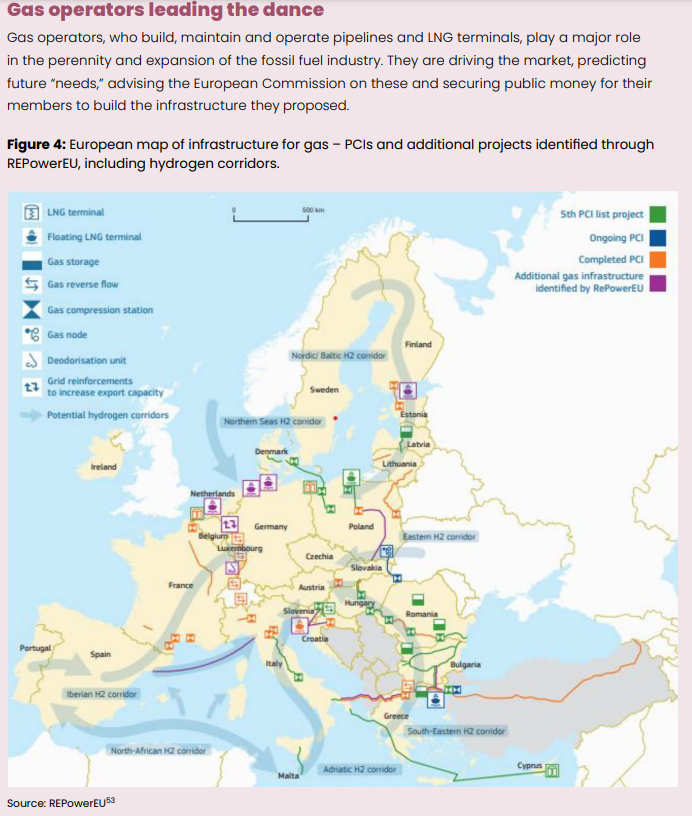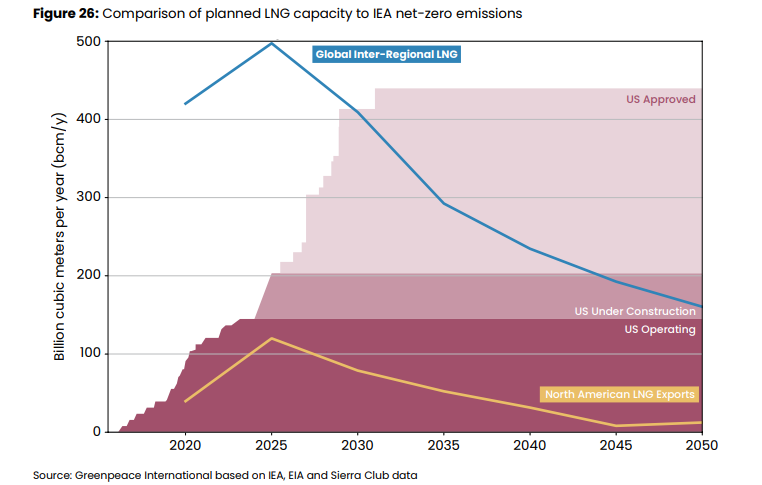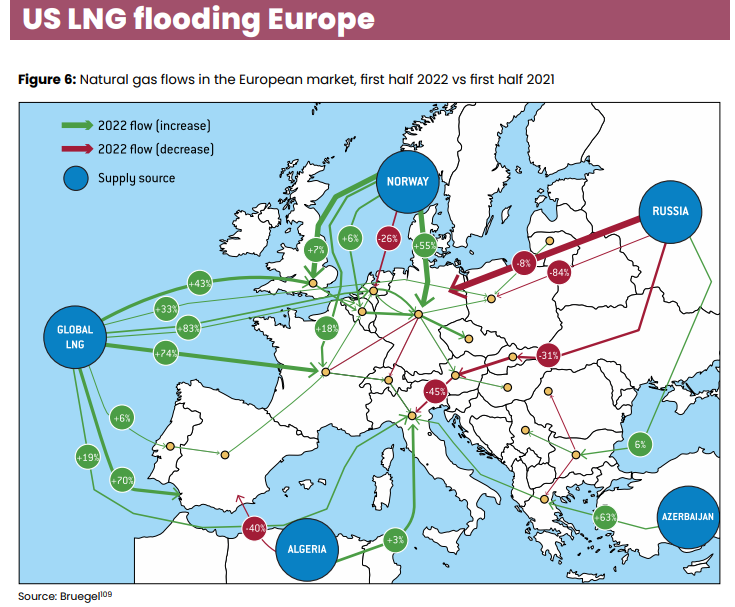Greenpeace has released a condemning report which accuses gas corporations of capitalising from the war in Ukraine.
As Greenpeace stated, what followed was one of the most blatant examples of ‘shock doctrine,’ where gas operators quickly shifted their public messaging and lobbying from “energy transition” to “energy security” and cynically used the opportunity to frighten governments into massive, unneeded investment into and expansion of fossil gas imports and infrastructure.
These tactics have resulted in a short-term energy supply crisis being answered by long-term fossil fuel lock-in in the form of new infrastructure, decades long contracts, and environmental impact in the US, as well as in the EU. According to Greenpeace, This overreaction jeopardises the EU’s and US’ energy transition and their agreed climate goals.
 The shift was instant and effective. The REPowerEU plan, the EU answer to the gas crisis, included around €10 billion ($20.9 billion) in funding for gas infrastructure. Eight liquefied gas terminals are under construction, and 38 more have been proposed, Greenpeace highlights.
The shift was instant and effective. The REPowerEU plan, the EU answer to the gas crisis, included around €10 billion ($20.9 billion) in funding for gas infrastructure. Eight liquefied gas terminals are under construction, and 38 more have been proposed, Greenpeace highlights.
Greenpeace accuses that replacing Russian pipeline gas led to a surge of shipments of liquefied gas (also known as LNG) from the US. As a result, gas infrastructure operators, portfolio traders, and gas companies have declared that imported liquefied gas is the answer to the crisis and will remain so for decades to come. The report presents that LNG expansion threatens the health of communities living near these export terminals, extraction sites, and pipelines, while potentially pushing planet warming emissions past levels to meet global climate goals.
The organization claims that shareholders of the world’s top five oil and gas companies saw record profits of €192 billion ($209 billion) and distributed $102 billion (€93 billion)in the form of dividends and share-buy-backs in 2022.
Greenpeace’ s recommendations
According to Greenpeace, the latest IPCC (Intergovernmental Panel on Climate Change) report is clear. This decade is critical for making rapid, deep cuts to emissions and protecting people from dangerous climate impacts533. These warnings are reinforced by UN Secretary-General António Guterres: “Fossil fuels are a dead end – for our planet, for humanity, and yes, for economies”
1) Remove fossil fuels from politics
- instituting a firewall to end their access to decision-making including through lobby meetings and seats on expert, advisory, or public research bodies;
- ending conflicts of interest, revolving doors between public office and industry, hirings of industry consultants, and other ways of protecting and facilitating vested interests;
- excluding fossil fuel industry representatives from climate negotiations, government delegations, trade missions, or other positions of co-opted influence; and
- rejecting partnerships with the fossil fuel industry, including sponsorships, appearances at each other’s events, and organising industry occasions on government premises including parliaments.
2) End ENTSOG’s lobbying on behalf of the gas industry
ENTSO-G – created to ensure, inter alia, “optimal management” has a privileged relationship with European policy-makers which presents a conflict of interest, through its role to predict future gas use and propose the infrastructure projects to meet it. ENTSOG has consistently overestimated future gas demand and projects backed by ENTSOG members have raked in the vast bulk of European public funds for such infrastructure
3) Ensure full transparency of all available data
On gas flows into, within and out of the EU, including and separating into import, export, re-export and transshipments (including ship-toship transfers), as well as on utilisation rates of regasification capacity and trans-border pipeline connections.
4) Further strengthen, adopt and enforce due diligence legislation at European and nationals levels
5) Set targets for climate neutrality by 2040 in the EU and the US and develop pathways (including detailed greenhouse gas budgets) to get there.
In the EU in particular, work throughout 2023 must lay proper foundations for an ambitious proposal to be presented in Spring 2024, under the Belgian EU presidency and in a context of European parliamentary elections.
6) Pursue an active fossil gas phase-out by 2035.
This requires not only proactive phase-out policies at the national level including measures such as banning instead of subsidising gas boilers and providing tailored financial incentives, but also coordinated action to stem the flow of gas into Europe, phase-out existing gas import and transport infrastructure, and prevent future lock-in by stopping new construction and banning long-term contracts. Due to its higher carbon intensity and risk of methane leaks, imports of LNG should be phased out first.
How to cancel LNG:
- Set mandatory gas reduction targets at EU and national levels, gradually increasing the current (still voluntary) target of -15%.
- Cancel all projects for the construction of new LNG import terminals and expansion of existing terminals across the EU.
- Halt the conclusion of new long-term contracts for the delivery of LNG, and ban extension of existing contracts. No gas supply contract should be allowed to run beyond 2035, nor create a barrier for the development of renewables.
 7) Properly account for the higher lifecycle emissions of LNG
7) Properly account for the higher lifecycle emissions of LNG
compared to pipelined gas, in developing pathways and efforts in order to get us to climate neutrality by 2040.
8) Critically assess hydrogen projections and projects
pushed by the fossil fuel industry, including claims of “hydrogen readiness” (which may be technically feasible, but not necessarily justify the construction of additional gas infrastructure), “terminal conversion” (which has been shown to be a technical and financial challenge), and “green” or even “renewable” hydrogen (for which detraction of direct electricity use it would be hard to see a meaningful application before 2030).


































































